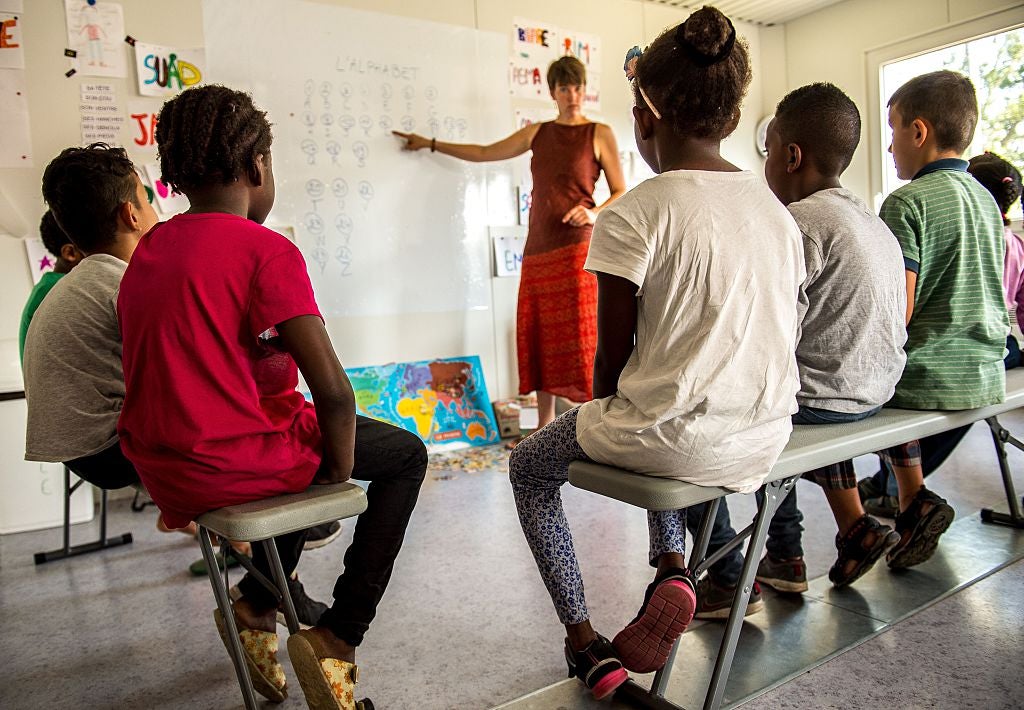Calais Jungle children must get fast-track scheme to be resettled in UK, anti-slavery commissioner urges
Kevin Hyland says migrants have more trust in smugglers than in state-led procedures

Your support helps us to tell the story
From reproductive rights to climate change to Big Tech, The Independent is on the ground when the story is developing. Whether it's investigating the financials of Elon Musk's pro-Trump PAC or producing our latest documentary, 'The A Word', which shines a light on the American women fighting for reproductive rights, we know how important it is to parse out the facts from the messaging.
At such a critical moment in US history, we need reporters on the ground. Your donation allows us to keep sending journalists to speak to both sides of the story.
The Independent is trusted by Americans across the entire political spectrum. And unlike many other quality news outlets, we choose not to lock Americans out of our reporting and analysis with paywalls. We believe quality journalism should be available to everyone, paid for by those who can afford it.
Your support makes all the difference.Children in the Calais Jungle are risking their lives every night as they attempt to reach the UK, Britain's anti-slavery commissioner has warned as he called for ministers to step up efforts to address the plight of lone youngsters in the camp.
Minors are turning to smuggling gangs rather than official routes for claiming asylum or joining relatives who are already in this country, Kevin Hyland suggested.
In a letter to Home Secretary Amber Rudd, the commissioner painted a stark picture of the threats faced by children and other vulnerable individuals living in migrant camps such as the Jungle.
In a conclusion that will heap fresh pressure on the Government over the issue, he said he is convinced that frustration with, and lack of confidence in, regulations known as the Dublin III procedures “is one of the key motivators behind risk-taking behaviour, which leads to higher exposure to modern slavery and exploitation”.
Under Dublin III, asylum claims must be made in the first safe country a person reaches – but children can have their claim transferred to another country if they have family members living there.
Campaigners have repeatedly called for the process to be sped up so an estimated 185 children believed to be eligible for humanitarian protection in the UK can be transferred from Calais. The issue came under fresh scrutiny at the weekend as reports emerged that a teenage Afghan boy – said to have a legal right to travel to Britain – had died as he tried to climb onto the roof of a lorry near Calais.
In his letter, Mr Hyland commended the work of the British and French governments to secure borders and tackle smuggling networks – but added that not enough is being done to “address the vulnerabilities of migrants, in particular unaccompanied children”.
He said he received a “clear message” that there is “very little confidence in asylum seeking procedures in France”, as well as in the Dublin III regulations.
Some people had already applied for asylum in France or family reunification under Dublin III, but “every night they were continuously trying to cross the Channel illegally”. The letter said: “The waiting time was simply far too long for them. Unfortunately, migrants had more trust in smugglers than in state-led procedures that exist to ensure their protection.”
Mr Hyland recounted a story he was told of a woman with two young children who had family in the UK but was afraid to register for asylum in France. “She viewed her only option as going to smugglers to get herself and her children to the UK,” he said.

He said the Government should provide increased resources – and possibly deploy staff – to quickly identify children who qualify to be reunited with relatives in Britain, or relocated here under another initiative to bring unaccompanied refugee children from Europe. Mr Hyland also suggested that a fast-track system should be considered.
“Children are not waiting,” he wrote. “Every night they go to their smugglers who have promised to get them across the Channel. Every night they think that this time they will be lucky. However, every night each of these children are at risk of exploitation and sadly even dying as they take huge risks to reach the UK.”
Statistics indicate that in August there were 865 children living in the Jungle, with 676 of that number unaccompanied.
The commissioner, who visited Calais earlier this year, described living conditions in the Jungle as “unsuitable and unsafe”. It is “absolutely unacceptable” that children are left “at the disposal” of criminal networks, he said.
Groups identified by a project as being at high risk of exploitation and trafficking include young women from countries of the Horn of Africa and Egyptian boys who are forced to steal in Calais town and bring goods back to the camp, according to the letter.
PA
Join our commenting forum
Join thought-provoking conversations, follow other Independent readers and see their replies
Comments